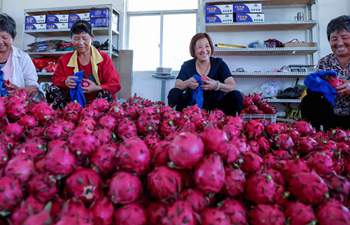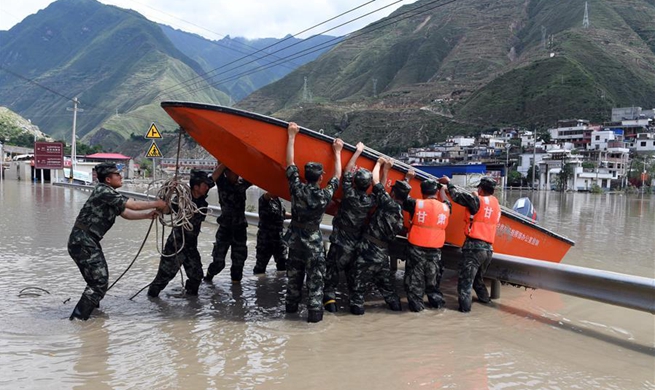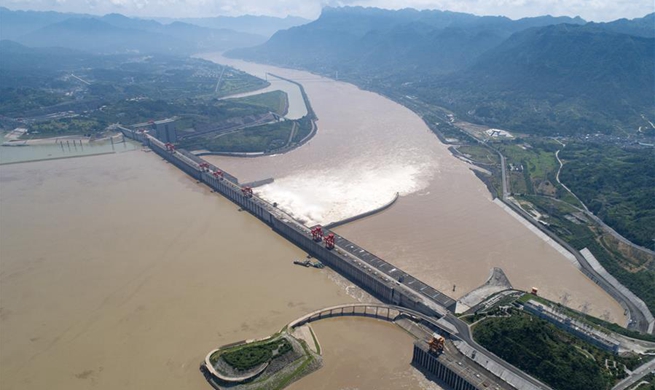MEXICO CITY, July 15 (Xinhua) -- Maura Alvarez, a resident of a small rural town on the edge of Mexico City, gathers rainwater to use for bathing, washing and even for cooking of food.
For the past five years, the 55-year-old woman has taken advantage of a system created by a group of young entrepreneurs who were looking for a solution to the lack of drinking water in the small community of Quiltepec. The community, which lies to the south of the Mexican capital, is home to 25 families.
Maura told Xinhua that the sustainability project, which belongs to the non-profit Isla Urbana, and at the request of residents and in collaboration with other organizations, has little by little turned the community into a successful eco-village.
"This has been possible because of the help from Isla Urbana which has managed to change the lives of everyone who lives here," Alvarez said as she showed off the rainwater harvesting system which was installed in the only room made of brick and concrete.
Everything began with a group of young people who decided to create a system to capture, store and treat rainwater and install them in Mexican homes that don't have access to drinking water.
The young people are working to mitigate the crisis that stems from a lack of drinking water and the ongoing problem with the flooding caused by the rain in areas of the Valley of Mexico, especially in low-income communities.
The project is called Isla Urbana, said the organization's communications director, Nabani Vera, who added that the system is simple, economical and functional.
"The system is adaptable to the needs of each household. The average price for each project is roughly 7,000 pesos (about 368 U.S. dollars)," Vera said.
The major part of that cost comes from a combination of places including foundation grants and financing plans. The beneficiaries pay a very small portion based on their income, Vera said. She added that Isla Urbana is projected to install 10,000 rainwater harvesting systems this year.
Before having the rainwater harvesting system, Alvarez recalled how each family had to go down the hill and carry water from distance houses, where the residents would only give them small amounts.
They also had to wait in line for the water truck, which is supposed to give out free water on a weekly basis. In the worst cases they had to buy the water which meant spending 800 pesos (about 42 U.S. dollars) every week or 15 days.
"It's different now, we don't need the water truck - maybe once a year - we have the rainwater harvesting system. It can store up to 1,100 liters of water enough to use for bathing, washing clothes and cooking meals," Alvarez said.
She has a small farm that is home to five chickens, a rooster, two ducks and three sheep. Alvarez also has a small patch she uses to grow nopals and flowers including lilies and jasmine which she sells in the city.
At the urging of Isla Urbana, Alvarez has a biodigestor where she mixes water with sheep manure to produce methane gas which she uses for cooking. She also has a composter which she uses to produce organic fertilizer which she uses on her plants and trees.
"When the weather is not warm, we struggle a bit, but two or three times a week we can heat water to use for bathing, cooking and to cook our beans," Alvarez said.
Elena Cruz is not only her neighbor, but also the first person in Quiltepec who contacted Isla Urbana six years ago.
"I had nothing to lose by contacting Isla Urbana. They came out, they looked around, and made a socioeconomic study; they asked for 1,000 pesos (about 53 U.S. dollars) upfront in order to buy the water storage tank and in three days they had installed the system," Cruz said.
She added that although she paid a little more, it really is a symbolic amount, because it wasn't even half of what the water storage tank cost.
And two years ago, she again asked Isla Urbana for its help to buy and install a solar heater. The benefit was they not only constructed an economical one, but also an efficient system that treats waste water that can be used in times of drought for the bathroom, to clean the house and water her fruit trees.
Nothing in Cruz's house goes to waste.
"The water comes from the washer or the one used in the kitchen - any water that doesn't have soap or bleach. The water is placed in a pool and from there passes to another pool that has at its base a special stone with small plants such as geraniums, lavender and reeds of horsetail," Cruz said.

















